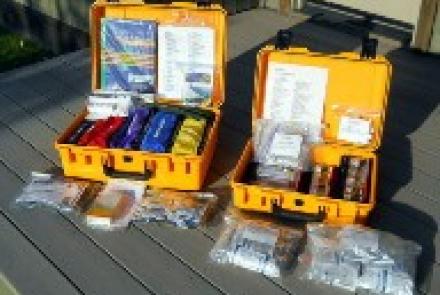Fire in the Boat – Lithium Batteries - Prevention: an Update
Lithium batteries are a fact of life in this day and age, and, like so many other things aboard, we must treat them with care. When I wrote the CCA article on Fire in the Boat – Prevention, I gently danced around the issue of fires in smaller Lithium-Ion and Lithium-Metal batteries. There I talked about the issues of charging them (don’t let that happen in a bunk or under a sail), and the high heat they generate when shorted.
I have become a bit more alert to this issue, especially as the airline industry is setting new standards for us regularly. They remember the flaming computer batteries and the Samsung Galaxy Note 7s, as well as the larger lithium battery problems in the Dreamliner.
The current TSA rules include the following, which you should think about aboard.
- Only have them where we all can see them and smell smoke: Li-batteries can only be in carry-on luggage, never checked. Aboard – make all Li-batteries readily accessible; do not hide them in the back of lockers or under other gear.
- Small Batteries only: You can carry on only 100 watt-hours or smaller batteries (covers standard computer batteries). Some airlines may let you carry on the larger, extended-life laptop batteries. Aboard – make sure your navigator does not bring many extra, oversize batteries.
- Make sure they do not short out, causing flames: tape or otherwise isolate the contacts. Aboard – do this, but also, DO NOT let them get wet, especially with salt water, as that will short them quickly. If you have a leaking deck, keep the batteries away from there. Keep all spares in well-sealed plastic bins. Figure out how to keep computers and other devices dry.
These points cover only the smaller, personal batteries we have in our laptops, smartphones, etc. But watch out for new gadgets, like “smart luggage”, which airlines do not allow as checked luggage unless the batteries are removed, and which we should probably ban from boats.
The larger lithium batteries used for house banks, etc. have totally different issues, and we cannot cover all of those here. For example, many of them have devices to disconnect themselves if they begin short or otherwise heat up. However remember even Boeing did not get it right on the 787 Dreamliner. I did heard a story told by a Mini-Transat skipper about seeing one of his lithium house batteries heat up. He had to quickly disconnect it and heave it overboard, at which point it burst into a major conflagration. He was very happy to have gotten it off the boat in time.
……Richard York, CCA, NY Station Safety Officer; CCA, Seamanship and Safety Committee.





